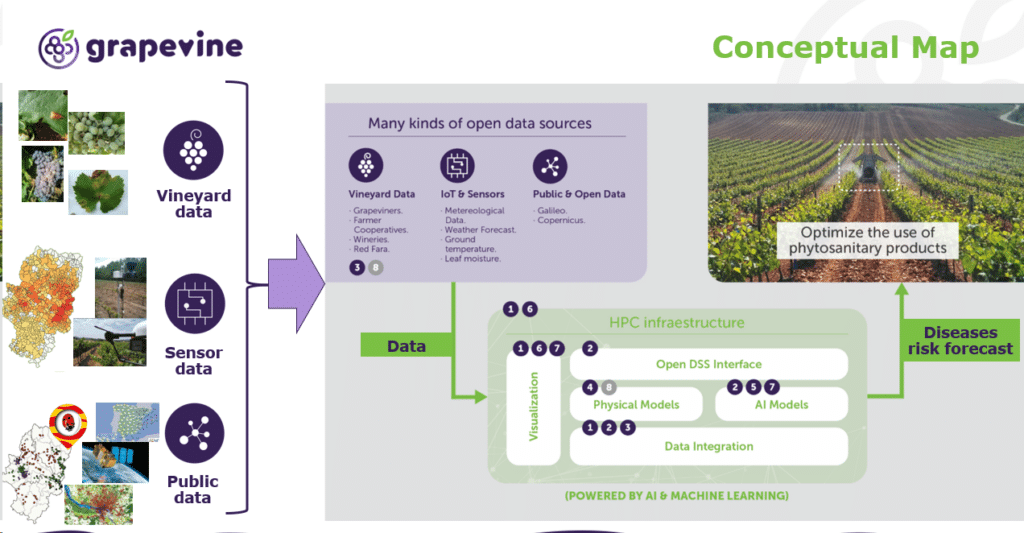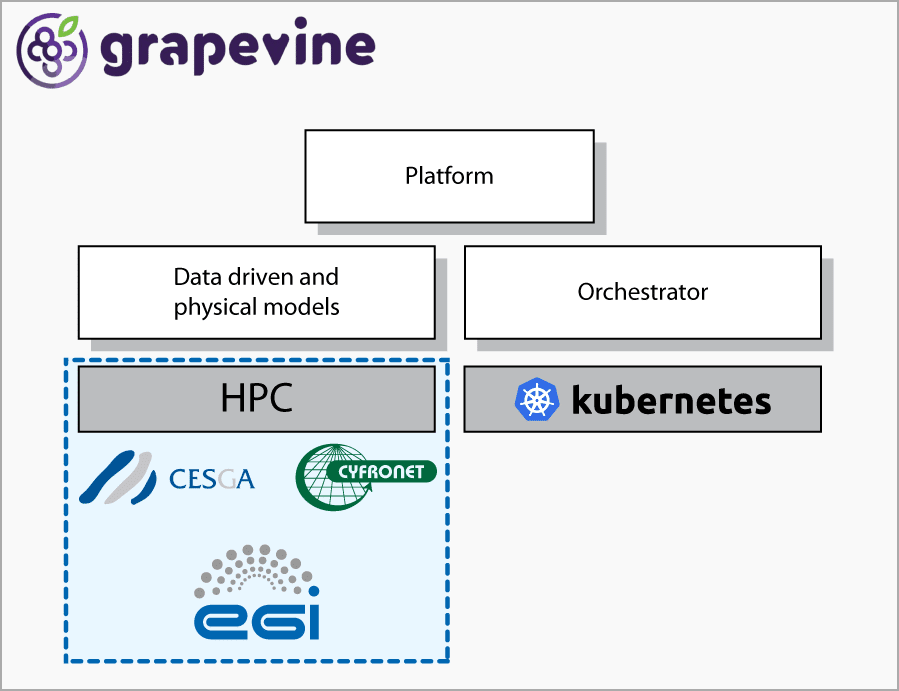GRAPEVINE was a three-year project that aimed to adapt a set of phenological, disease and meteorological models to improve prevention and control of grape diseases in viticulture.
Grapevine: Reducing Environmental Impact Via Better Use of Phytosanitary Products

About
GRAPEVINE (High performance computing services for prevention and control of pests in fruit crops) was a three-year project that aimed to adapt a set of phenological, disease and meteorological models to the field of viticulture, with the ultimate goal of training a predictive model based on Machine Learning techniques to improve the prevention and control of grape diseases in the wine industry.

The challenge
GRAPEVINE aimed to improve current pest prediction and control systems in the wine sector, thanks to Big Data and Artificial Intelligence technologies. One of its challenges was the improvement of existing Machine Learning predictive models to offer a more effective response to the treatment of pests and reduce the amount of fungicide and its number of treatments. The developed services were tested to forecast grapevine diseases in Aragon (Spain) and the Protected Denomination of Origin region of Goumenissa (Greece). Implementing these services required the execution of complex computational tasks, mainly the high-resolution calculation of meteorological models for forecasting the evolution of grape diseases, which are resource-intensive tasks. As these resources are quickly consumed, many High-Performance Computing (HPC) resources are needed.
The implementation required a modular and cross-border solution with components that can be distributed and coordinated by an HPC orchestration solution to become an intelligent decision support tool for grapevine farmers adaptable to other regions. A large amount of existing data was used to adapt the models to specific grape varieties, phenological specificities, climatic conditions, and the training of Deep Learning algorithms.
Additionally, the amount of data managed required the computational activities to be close to the data source to execute efficient data transfers and collection of results.
Provision of HPC resources to cover the lack of HPC resources existing in the project due to the high computational demand of their tasks. EGI, being a federation of computing and storage resource providers, can provide the necessary resources to meet the project’s computational demands.
By hosting the platform with EGI, GRAPEVINE could run computations much closer to the source data, which was initially housed at CESGA. This proximity significantly improved resource allocation efficiency by eliminating the need for large-scale data transfer, thus optimising computational tasks.
Collaboration and Support: The EGI Foundation offered a supportive and collaborative environment, being geared towards supporting research and development. Their expertise in managing such infrastructures has been valuable in ensuring the success of the GRAPEVINE project.
In comparison to commercial cloud providers, such as AWS or Google Cloud, EGI offers a community-driven, collaborative, and cost-effective solution for researchers, making it a better fit for the GRAPEVINE project’s needs.
Services Provided by EGI
Execute thousands of computational tasks to analyse large datasets
Dedicated computing and storage for training and education

EGI-ACE has been instrumental in the success of the GRAPEVINE project. Their allocation of High-Performance Computing resources came at a critical juncture, enabling us to continue our weather simulations tasks when our initial resources were exhausted. The EGI-ACE's commitment to fostering research and development proved invaluable, offering a lifeline that allowed us to complete our work effectively and efficiently. Without their support, achieving our project objectives would have been a much more daunting, if not impossible, task. EGI-ACE's contribution has been a cornerstone of GRAPEVINE's success.
Rafael del Hoyo Alonso, GRAPEVINE project coordinator
Impact
from 2 different providers





